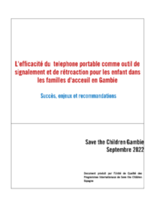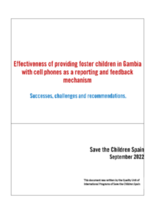childrens_living_arrangement
Displaying 1 - 10 of 17
Panama, Uganda, Sri Lanka and Czech Republic among those newly committing to totally prohibit violence against under-18s.
A bill seeking to repeal Gambia's ban on female genital mutilation (FGM) was presented in the West African country's parliament on Monday and will be discussed by lawmakers later this month. Former president Yahya Jammeh banned the practice in 2015 and introduced steep fines and jail sentences for perpetrators.
The objective of this webinar was to present the best practices learnt in the implementation of the foster care system as an alternative to limited child care institutions for children on the move in The Gambia.
The objective of this webinar is to present the best practices learnt in the implementation of the foster care system as an alternative to limited child care institutions for children on the move in The Gambia.
Save the Children a développé ce programme d'apprentissage afin d'évaluer l'utilisation des téléphones portables comme mécanismes d'information et de rétroaction pour les enfants placés en Gambie et de déterminer s'il est efficace et sécurisé.
Save the Children has developed this learning agenda in order to assess the use of cell phones as information and feedback mechanisms for foster children in Gambia and to determine whether it is effective and secure.
The number of care services and institutions in The Gambia which could respond to the needs of children on the move where they are is extremely limited and underresourced. Most often, care arrangements are made informally in the communities. Child migrants identified are often handed over to the police. Access to food and accommodation services also poses significant challenges.
This paper examines all policy and laws related to families in the South, West, East and Central regions of sub-Saharan Africa.
The special issue of Emerging Adulthood titled “Care-Leaving in Africa” is the first collection of essays on care-leaving by African scholars. This article, coauthored by scholars from North and South, argues in favor of North–South dialogue but highlights several challenges inherent in this, including the indigenizing and thus marginalizing of African experience and scholarship and divergent constructions of key social concepts.
This study sought to determine the risk and prevalence of drug abuse among street children focusing on those in the car parks in the Gambia.


